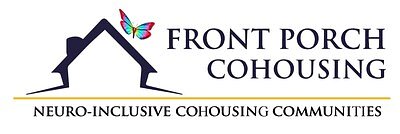
Beyond Bricks & Mortar: Front Porch Cohousing Builds Inclusive Communities for a Neurodiverse Future
As demand for accessible housing rises, Front Porch Cohousing expands its leadership team to scale innovative, neuroinclusive cohousing communities. A look at the growing movement & what it means for the future of sustainable living.
Beyond Bricks & Mortar: Front Porch Cohousing Builds Inclusive Communities for a Neurodiverse Future
Doylestown, PA – November 7, 2025 – Front Porch Cohousing, a pioneering social enterprise dedicated to creating neuroinclusive cohousing communities, is doubling down on its mission with the appointment of two strategic advisors. Desiree Kameka Galloway and Danielle Vickers join the organization to bolster its community development efforts and strengthen its financial sustainability, signaling a strategic push to scale its unique model of inclusive living.
Beyond the rising costs of housing and increasing urban density, a growing segment of the population faces a critical gap in accessible and supportive living options. Front Porch Cohousing is responding to this need by developing communities where adults with and without disabilities live, learn, and grow together, fostering mutual support and purpose-driven lives. This isn’t simply about physical accessibility, but creating environments that actively embrace neurodiversity – recognizing and valuing the natural variations in human brain function.
“There's a real hunger for connection and belonging, especially for individuals who haven’t always found a place where they can truly be themselves,” says a community planner familiar with the cohousing movement. “Front Porch Cohousing’s approach addresses that directly, and is tapping into a growing trend.”
Meeting the Demand for Inclusive Housing
The appointment of Desiree Kameka Galloway as Strategic Advisor for Community Development & Operations is particularly significant. Galloway brings over two decades of experience in housing solutions for individuals with disabilities and those who are neurodivergent, and is a nationally recognized expert in the field. Her expertise will be instrumental in guiding the creation of communities tailored to diverse needs, ensuring that accessibility and inclusivity are woven into the very fabric of each development.
“For too long, housing options have been one-size-fits-all,” explains a disability advocate. “What Front Porch Cohousing is doing is recognizing that everyone deserves a home that supports their individual needs and allows them to thrive. It's a model that other developers should be looking at.”
Data confirms this increasing need. Market research indicates a growing demand for accessible housing solutions, fueled by aging populations and a heightened awareness of neurodiversity. The global market is projected to grow significantly in the coming years, highlighting the urgency of addressing this critical gap.
Securing a Sustainable Future
Complementing Galloway’s focus on program development is Danielle Vickers, who takes on the role of Strategic Advisor for Major Gifts & Campaign Development. Vickers brings over 20 years of fundraising experience, having secured over $10 million in major gifts for mission-driven organizations. Her expertise will be crucial in bolstering the organization’s financial sustainability and expanding its reach.
“Non-profits like Front Porch Cohousing rely heavily on philanthropic support,” notes a fundraising consultant. “Vickers’s track record demonstrates her ability to cultivate relationships with donors and secure the funding needed to scale impactful programs.”
Front Porch Cohousing’s financial strategy appears focused on long-term sustainability, relying heavily on grants and donations rather than venture capital. This commitment to community-driven funding reflects the organization’s core values and its dedication to creating lasting impact.
The Promise of Cohousing
The cohousing model itself is gaining traction as a viable alternative to traditional housing options. It’s based on the principles of intentional community, shared resources, and collaborative living. Residents typically share common facilities, such as kitchens, dining areas, and gardens, fostering a sense of connection and mutual support.
“Cohousing isn’t just about the physical buildings; it’s about the relationships and the sense of belonging,” explains a resident of an established cohousing community. “It’s about creating a place where you know your neighbors and can rely on each other.”
For individuals with disabilities or neurodivergent conditions, this sense of community can be particularly beneficial. The shared resources and collaborative environment can reduce social isolation and provide access to support networks. The intentional design of cohousing communities, with a focus on accessibility and inclusivity, can create a safe and welcoming environment for all residents.
Scaling Impact
The appointments of Galloway and Vickers mark a pivotal moment for Front Porch Cohousing. With a strengthened leadership team and a clear vision for the future, the organization is poised to scale its impact and address the growing demand for inclusive housing options.
“This is more than just building homes; it’s about building a more equitable and inclusive society,” says a community planner. “Front Porch Cohousing is demonstrating that it’s possible to create communities where everyone can thrive.”
The challenge now lies in replicating this model in other communities across the country. Addressing issues such as zoning regulations, funding constraints, and public awareness will be crucial to ensuring that the benefits of neuroinclusive cohousing are accessible to all. However, with a growing movement and a commitment to innovation, the future looks promising for Front Porch Cohousing and the communities it serves.
